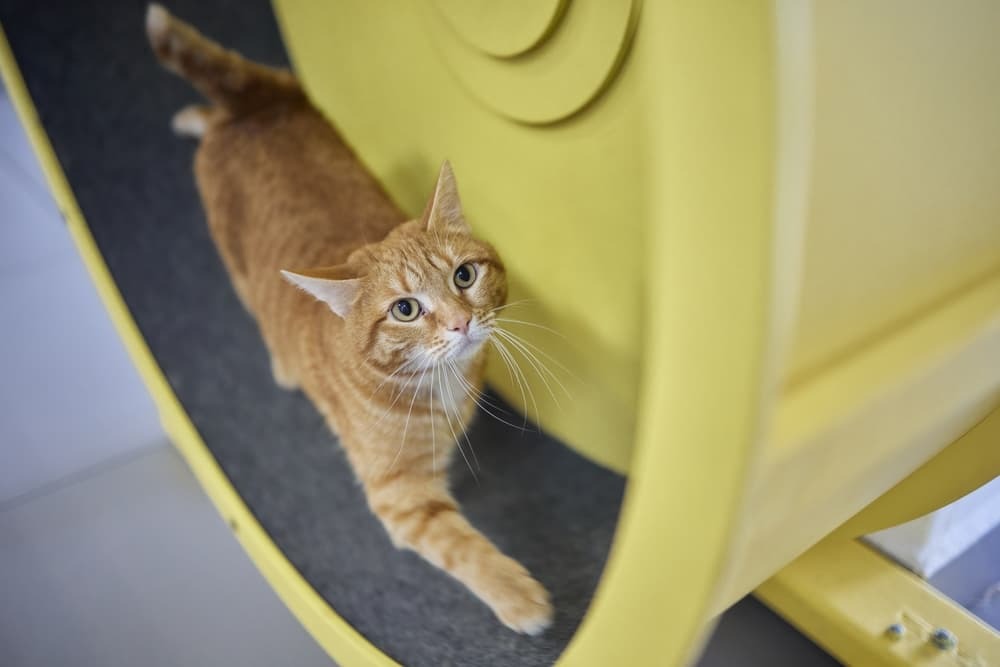How Often Do Cats Poop?

Cat owners are no strangers to their feline’s bowel movements. Since most cats go in litter boxes that are frequently cleaned by their owners, we get a front-row seat to exactly what’s happening with our furry friend’s poop.
But what is that poop telling you, exactly?
Here’s what you need to know about your cat’s poop to ensure they’re as healthy — and regular — as they should be.
How Often Do Cats Poop?
Every cat will be different, but for the most part, your cat should poop once or twice a day. The more important thing is that whatever the normal number is for your cat, “if you monitor your cat’s bathroom habits, the number of times they poop a day should be consistent,” says Dr. Sara Ochoa, DVM, veterinarian at Whitehouse Veterinary Hospital.
The size and breed of your cat won’t really play into how often they poop, either.
How Often Do Kittens Poop?
Kittens may poop a little more frequently than once or twice a day, but they’re also usually eating a little more often than older cats. “As your kitten gets older, they also decrease the frequency that they are pooping,” Ochoa explains.
How Long Can a Cat Go Without Pooping?
Believe it or not, most cats can go a few days without pooping before you need to worry. In fact, Ochoa often sees cats go a day or two without pooping if they aren’t eating regularly, or if they were put on a fasting diet to prepare for surgery.
Cat Not Pooping: Common Causes

Constipation — or the act of not pooping — can be caused by several factors. Some common ones include:
Diet. If your cat is eating a diet that is too high in fiber, then they may also not be pooping, says small animal veterinarian Dr. Sarah Wooten.
Dehydration. Cats can easily become dehydrated if they aren’t drinking enough water. This in turn can cause them to become constipated.
Blockage. Mischievous cats may eat things that they shouldn’t, like string or their cat toys. “This can cause an obstruction, causing them to not be able to poop,” Ochoa says. Consuming bones or hair can also cause constipation, Wooten adds.
Other causes of constipation can include:
- Lack of exercise
- Dirty litter box causing them to ‘hold it’
- Stress from a hospital visit
- Certain medications
- Neurological conditions like sacral nerve trauma or spinal cord disease
- Hormonal or electrolyte imbalances
- Narrowed pelvic canal due to incorrectly healed pelvic fracture
- Tumors of the rectum
- Rectal diverticulum
- Anal sac disease
- Bite wounds or trauma to anus
What to Do if Your Cat Isn’t Pooping

If you’ve noticed a change in your cat’s fecal movements, or if they haven’t pooped in several days, there are some things you can do to try to help. First, try adding some cat laxatives to their diet. “You can get this at the pet store, and it’s often sold as hairball medications,” Ochoa says.
Another option is to give your cat MiraLAX. “MiraLAX works by increasing the water in your cat’s colon, helping the poop become softer,” Ochoa says. “Adding a small amount [generally ⅛ to ¼ teaspoon] to their food will help them poop more easily.” However, before giving your cat laxatives, it is always a good idea to talk to your vet first.
Certain pain medications can also cause constipation. If you believe this could be the reason for your pet’s poop problems, consult with your veterinarian about decreasing, or even stopping, the medicine to help clear it up.
If your cat hasn’t pooped for more than two days, it’s best to pay your veterinarian a visit. “Your veterinarian will want to take X-rays to see if they are constipated, and what their intestines look like,” Ochoa says. “They may also give your cat an enema to help alleviate this constipation.”
Products to Help Cat Poop Problems
Remember to always consult with your veterinarian if you’re worried about a change in your cat’s pooping consistency or frequency, as over-the-counter products won’t help when a more serious issue is at play. If you’re interested in trying out some products at home to help your cat poop more regularly, ask your veterinarian about fiber, prebiotic and probiotic supplements that can provide digestive support.









